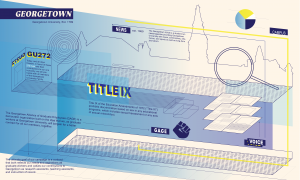Georgetown University will replace its “Engaging Diversity” core curriculum requirement with “Pathways to Social Justice” beginning with the Class of 2027, GUSA announced in its biweekly newsletter for student feedback on March 2. The proposal revises learning goals for courses under the requirement, provides additional funding and oversight for its courses, and establishes a one-credit seminar on Race, Power and Justice at Georgetown.
The proposal was created by the Main Campus Core Curriculum Committee’s Engaging Diversity Revision Subcommittee (EDRS) and based on an October 2021 research report from The Hub for Equity and Innovation in Higher Education.
The “Engaging Diversity” Core Curriculum requirement was enacted in Fall 2016 with a provision that the requirement be evaluated and updated after five years. The Main Campus Core Curriculum Committee (MC4) began studying the requirement’s impact in 2020, engaging a range of faculty, students, and campus offices in a two-year process to create the proposal for an updated curriculum.
The most visible change the report’s authors recommended was the renaming of the requirement, reflecting the curriculum’s updated understanding of diversity.
“Shifting the requirement’s nominal emphasis from ‘Diversity’ to ‘Social Justice’ maintains its alignment with Jesuit principles while moving away from a simplistic acknowledgment of identity toward a more nuanced understanding of the complicated effects that diversity has on social and political relationships,” the proposal read.
The proposal will also revise the requirement’s learning goals to facilitate students’ critical understanding of power differentials that have “created and maintained unequal access to resources that have disadvantaged some communities while advantaging others,” the proposal states.
“The study of power, systems of domination, and imagining justice more adequately capture the goal and function of the requirement than the nebulous term ‘diversity’ does,” Amanda Yen (CAS ’23), co-chair of EDRS, wrote to the Voice.
The proposal will also implement a required one-credit seminar in Race, Power, and Justice at Georgetown for students to develop a baseline knowledge of race and power dynamics, initiated by ongoing calls for racial justice on race at the university. The course is intended to provide opportunities for students and faculty alike to reflect on Georgetown’s history, according to subcommittee member and associate professor Shareen Joshi.
“Part of the experience of being at Georgetown is developing the capacity to reflect on the place and the institution you are in now,” Joshi said. “I think that’s a life skill—to be able to look at whatever institution you’re a part of and really be aware of it, be educated about it and reflect on it—that’s not an easy thing to do. But it’s easier if we do it together, all of us together, professors, students, administrators, everybody on the same page.”
Pathways to Social Justice will maintain the overlay quality of Engaging Diversity, meaning that students can fulfill the requirement with courses taken for other purposes, such as major or other core requirements. However, the proposal calls for greater intentionality in the selection of courses that qualify for the requirement. The report’s findings showed that by the time of graduation, students estimated they had taken two courses that met the requirement, when on average they had taken seven courses.
“When the original requirement was implemented, there was no uniform or consistent way for classes to get tagged as part of the requirement,” Dr. Amanda Phillips, co-chair of EDRS, said.
To address this shortcoming, the subcommittee calls for at least three of the five proposed instructional priorities to be meaningfully incorporated into courses bearing the “Pathways to Social Justice” attribute. The five priorities include inclusive scholarship, intersectional approaches to identity, historical legacies of inequality and their contemporary impacts, national, regional, and global comparisons, and imagining justice. The Provost’s Office Pathways to Social Justice Committee will decide which courses satisfy the requirement and provide support for the Race, Power, and Justice at Georgetown seminar.
“We wanted to be intentional, we wanted to be focused, and we wanted to be balanced,” Joshi said.
Furthermore, the proposal calls for the university to fund training, support, and compensation for contributing faculty, who perform extra work for the core requirement. Dr. Phillips said this decision was informed by academic literature that finds that professors teaching diversity-oriented courses receive lower student evaluations. The emotional labor that may go into mediating potentially tense class discussions was also a consideration, they said.
According to Yen, this component of the proposal also drew heavily on the 2020 Campus Climate Survey.
“[The climate survey] reported that students of color faced much higher levels of prejudice and discrimination compared to their white peers, and that the majority of students regardless of race did not believe diversity was a real priority of the university, evidenced in insufficient programming and financial investment,” Yen said.
There is also a provision for new requirements to be evaluated annually with plans for revisions in five years.
“We were very aware that whatever we are doing becomes part of Georgetown’s curriculum for the next 10, 20, 30, maybe 50 years,” Joshi said. “It should not be designed for the short term based on today’s national conversation. It should be something that is deeply meaningful and we can stand by when that national conversation moves to something else, and we can still stand by this. It has to have staying power.”
Amanda Yen is a member of the Voice as a staff writer.




